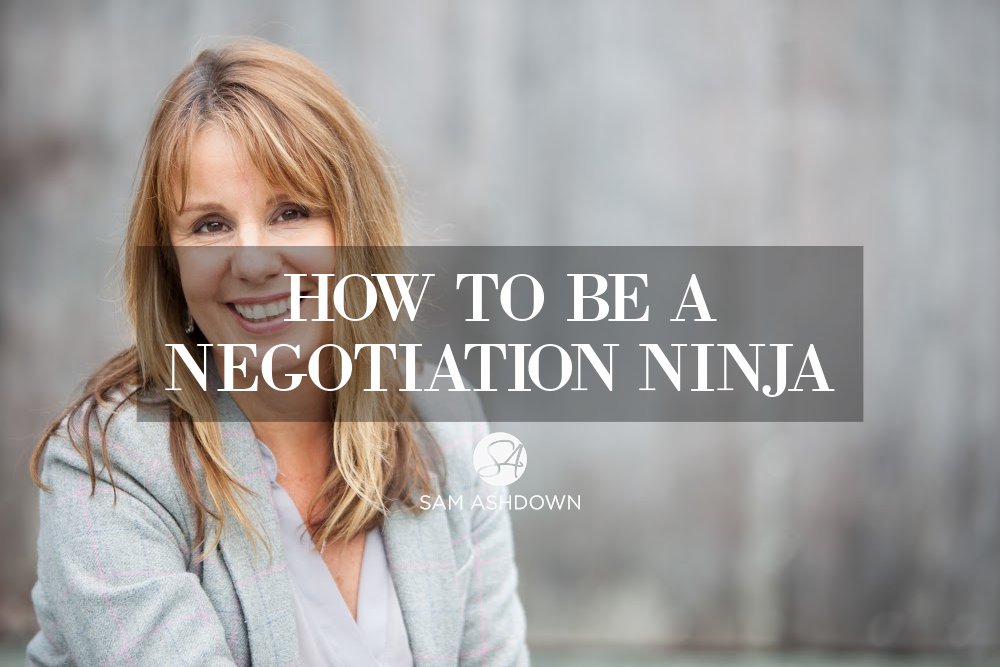“I’ve just got an offer on Green View!”
It was first thing on a Monday morning and Maria – our Client Executive – was thrilled.
Green View had been for sale for months with very little interest. We were due a price review the following week, but this offer was £550,000 on £600,000 – 91.7%. A brilliant start.
However, what we did next made a huge difference to everyone involved….
What do you do when you get an offer?
Do you put the offer forward, and advise your client to hold out for a better offer? Or do you simply tell your client the offer, and let them make up their own mind? Perhaps you call the client and urge them to take it?
Or do you negotiate the offer before you put it forward?
Because that’s what we do.
What I’m going to describe in this article, is a ninja negotiation tactic that in my experience, is so underused, it’s almost unheard of.
But it works so well, I want to make sure you add this skill to your armoury, so you never undersell a property again.
I’m going to tell you exactly what to say, when to say, and how to make sure your client gets a better result, ie a higher final sale price on their house.
This tactic will create a ‘reputation for success’ by delighting your clients so that they refer you more often, and more robustly, to their friends, family and neighbours.
And let’s not forget that a higher sale price also means more profit for you, so you can grow your agency faster and more securely.
Before we get into the exact details of this ninja negotiating tactic, let’s just look at what happens when you get an offer on a house that’s become stale.
You’re about to suggest a price review on a house that’s been sticking for months, when out of nowhere, you get a viewing. The viewing turns into an offer, but it’s below the figure the owner wants. From the first time you chatted in the valuation, to winning the instruction, and in all your communications since, you’ve wanted the best outcome for your client. But when the offer comes in, even though it’s low, you find yourself willing your client to take it.
In fact, your allegiance to – and even liking for – your client has switched to the buyer. You find yourself rooting for the buyer, and hoping the seller – your client – will accept an offer of less than the asking price you recommended all those months ago.
What’s happened?
It’s perfectly natural for you to want to get a deal done on a property you’ve had for ages. But at what cost?
What did you say to the homeowner in the initial valuation visit when they challenged you on your fee, or asked how you would do a better job that your competitors? Didn’t you claim to be an ace negotiator, and ultimately win them a higher sale price?
Yet, when the chips are down and your negotiation skills are on the line, you just want to get the deal done, at almost any price. After all, a £50k price drop for your seller is only a few hundred pounds off your fee. And a reduced fee is better than no fee….
STOP!
This isn’t a fair approach, is it? It’s not the deal your client signed up for. They placed their trust in you. They took you at your word when you promised to do everything you could to get them the price they wanted on their home. They believed you when you said you would negotiate hard on their behalf.
So – here’s where the rubber meets the road: time to fulfil that promise you made to them.
You said you’d negotiate hard, so step up, and do exactly that.
And let’s be clear: putting forward on an offer is not negotiating.
You’re simply passing the buck; transferring the responsibility from you to them, for the final price agreed.
At the point of negotiation is where you really earn your fee
We charge a selling fee of 1.5%. This may not be high for your area, but it’s the highest in ours – usually by half a percent. We’ve won instructions many times from other agents charging half of what we charge, because we have built up a reputation for – amongst other things – our negotiating skills.
We have to prove our worth. We have to demonstrate to our clients that they were right to choose us, even at a much higher fee – a difference of several thousands of pounds.
Let’s go back to our offer on Green View. Here’s what we did: we went back to the buyer and said:
“Thank you for your offer, we appreciate it. However, we know that it’s too low, we just don’t know how much too low.”
This will floor most buyers – they won’t be expecting this response from you. And because they are caught off guard, their demeanour and language often change. As the conversation develops, instead of talking in definitive statements, like “our offer is…”, they begin words like ‘try’, as in “let’s try £475,000”. We often find that they even ask for our advice, with a question like “I can go to £490,000, where do you think I should pitch my offer?”
This when you need to take control of the situation and demonstrate not just your negotiating skills, but also your leadership abilities. Here’s what to say next:rol of the situation.
“Would you like to review your offer, so that when I put it forward to the homeowner, you have the best chance of your offer being seriously considered?”
At this point, a buyer will almost always increase their offer. In fact, they do around 75% – 85% of the time. And it’s important that they do. Here’s why:
Most buyers will make a maximum of three offers
This means that if their offers keep being rejected, they may reach a point of giving up – either because
1. they just don’t want to pay the asking price, or
2. because they’ve lost heart in the purchase.
Buyers often feel that they lose face when their offer is rejected, and this can adversely affect how the sale proceeds – or doesn’t. It’s very important that the status of both the buyer and the seller stays as high as possible during this process. If one of them feels that their status is at risk, the deal may collapse.
Buyer psychology also dictates that the buyer needs to feel they are making good decisions, and minimising any risk. That’s why, if a buyer has their first offer accepted, they can often get cold feet down the line, wondering if they have perhaps been too hasty with their offer, and given money away. (The same thing often happens in a bidding war – how many times has it happened to you that the winning bidder changes their minds after they’ve ‘won’ the property?)
That’s why it’s vitally important that both seller and buyer feel they’ve got a good deal. Neither party wants to feel that they have left money on the table. With the buyer and seller both happy with the deal, you’ll have a more secure sale, one that is more likely to get over the line and complete.
Protect the status of the buyer and the seller
By keeping the initial offer high, the status of the seller is not damaged – they are not insulted or disheartened by too low an offer. By thanking the buyer for their offer, and giving them feedback and guidance on it, you’re also helping them to protect their status, so they feel encouraged to go higher, and hopeful you can reach an agreement, and they can buy the home they really want.
It also stands to reason that by starting with a higher initial offer, you have a much better chance of the final agreed sale price being as close as possible to the asking price.
When you put the offer forward to your client, explain that the original offer was lower, then put forward the revised offer. You’ve then ‘anchored’ the price, by introducing a lower offer first, then announcing the increased offer. Here’s what we would say before you present the offer:
“Good news – we have an offer on Green View. Now, before I tell you what it is, I’m going to recommend that you do not accept it. We think we can get a better price for you. The buyers originally offered less, but we’ve persuaded them to increase it before coming to you, so we know they are keen.”
By saying this, you’re laying the foundations of the negotiating process – preparing your client for hearing an offer you’ve already told them is too low, and you’ve demonstrated your negotiating skills in getting them an increased offer. Plus, you’ve shown leadership in taking control of the proceedings, so your client feels they are in safe hands during what can be an emotionally-challenging time for them.
This conversation should be short and succinct. Once you’ve delivered the short speech above, simply tell them the offer and ask for their permission to negotiate it. Something like this:
“The offer is ________. Do I have your authorisation to go back to the buyer and negotiate it on your behalf?”
Once you have their go ahead, call the buyer and work on the offer.
Negotiation doesn’t stop when your client is ready to accept an offer
Even if a client is comfortable with the level of an offer, and is happy to accept, we still try to negotiate a higher offer. We are mindful that our client is paying a higher fee to work with us, so at the very least, we try to win for them that difference on top of the offer they would have accepted.
For example, if the difference between our fee and that of our biggest competitor is £5,000, that’s the least we will try to squeeze out of the sale for our client. This is to demonstrate our gratitude for the opportunity to sell their home, and for the trust they have placed in us to do so.
We usually advise our clients to reject an offer of less than about 97%-98%, unless there are extenuating circumstance that means less than this is still a good offer. For example, if the house has been on the market for a long time with no other interest or if the seller has an urgent deadline. Our sellers are often surprised by this, but here again is your opportunity to earn your fee by displaying your leadership and negotiation skills.
You have to be a ninja negotiator
Your negotiation skills as a person, and as an agency, are of vital importance. There is little point in having the very best property marketing skills if you can’t successfully negotiate an offer once a buyer appears. It’s what you’ve promised, and what you’re being paid to do by your trusting client. And the profitability of your agency rests upon how good you are at it.
Ninja negotiation is one of the many topics and skills we teach independent agency clients via Firewave, our marketing agency and industry academy.
What could Firewave do for you and your agency? We have wonderful clients, all over the UK, who with our help, are now listing beautiful, high value homes. By teaching them ninja negotiating skills – alongside bespoke property marketing (and much much more) – they can build a proud reputation of getting the best sale prices for their clients, even with a much higher fee than their competitors’.
What to do next:
Go to www.fire-wave.co.uk/start and pop in the details of your competitive area, with no obligation to become a client. We can tell you if and how we can help you to reach your financial goals and be the best in your area.
And then join our private Facebook group here https://www.facebook.com/groups/FirewaveEA/ to discover the tricks, tactics and marketing strategies we use to grow our own agency, AshdownJones, so you too can have the agency of your dreams – systemised, profitable and growing strong.



